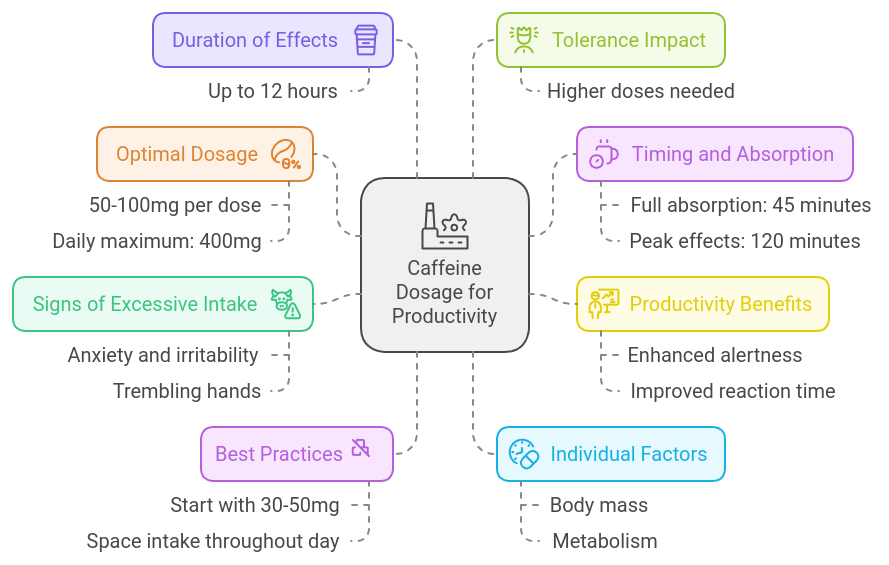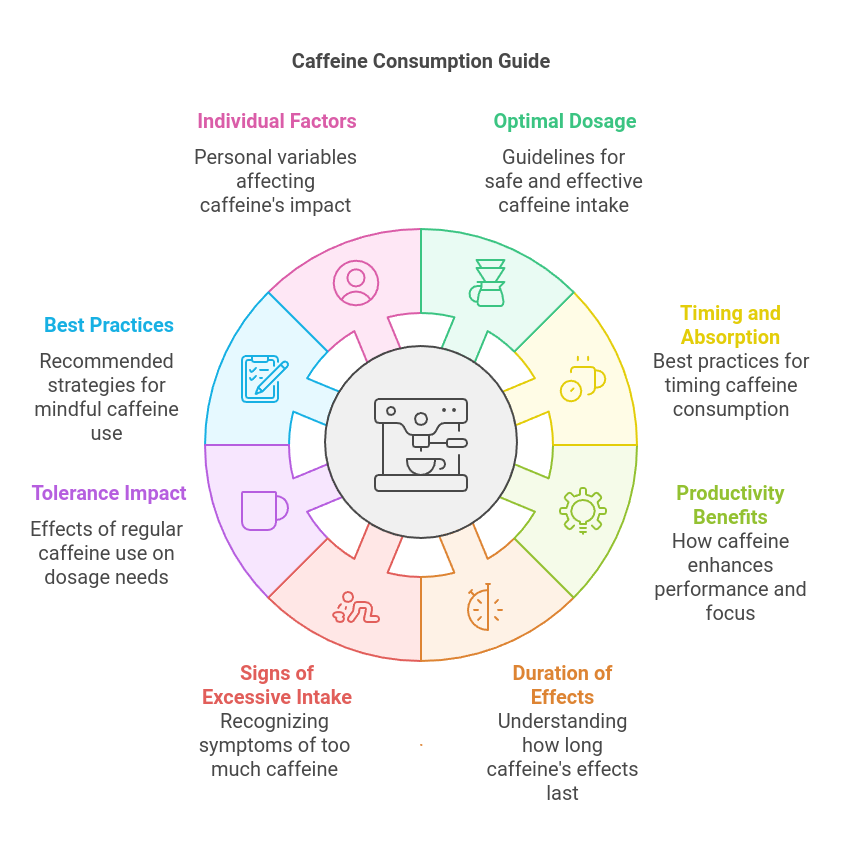Caffeine Dosage for Productivity: Unlocking Your Peak Performance
Are you looking to boost your productivity with caffeine? The ideal caffeine intake for enhanced performance falls between 50-100mg per dose, with a daily maximum of 400mg for healthy adults. Strategic caffeine use can significantly improve focus, alertness, and cognitive function when consumed properly.
Key Takeaways
- Optimal dosage: 50-100mg per dose, max 400mg daily
- Timing: Consume 60 minutes before peak performance needed
- Benefits: Enhanced alertness, improved reaction time, better short-term memory
- Best practices: Start low, space intake, stay within limits
- Individual factors: Consider body mass, metabolism, and caffeine sensitivity
Best Caffeine Dosage for Productivity
Finding the right caffeine dose is crucial for maximizing productivity without experiencing negative side effects. The ideal range for most people is between 50-100mg per dose, with a daily maximum of 400mg for healthy adults. This amount has been shown to provide significant cognitive benefits without causing jitters or anxiety.
For those seeking sustained focus throughout the day, microdosing caffeine can be an effective strategy. This involves consuming smaller amounts (20-100mg) of caffeine at regular intervals, rather than relying on large single doses. The ideal range for microdosing is between 50-100mg, which can help maintain steady energy levels and concentration.
Understanding Caffeine and Its Effects

How Caffeine Works
Caffeine works by blocking adenosine receptors in the brain, which are responsible for making us feel tired. By preventing adenosine from binding to these receptors, caffeine keeps us alert and focused. Additionally, it stimulates the release of neurotransmitters like dopamine and norepinephrine, which further enhance cognitive function.
How Long Does Caffeine Last?
The effects of caffeine can last up to 12 hours, depending on individual metabolism. However, peak effects typically occur within 120 minutes of consumption. This long duration means that timing your caffeine intake is crucial for optimal productivity throughout the day.
Finding Your Optimal Caffeine Dose

Recommended Caffeine Intake
While the general recommendation is 50-100mg per dose, it’s essential to find your personal sweet spot. Factors such as body weight, caffeine sensitivity, and prior consumption habits can all influence how you respond to caffeine.
Microdosing Caffeine for Steady Focus
Microdosing caffeine involves consuming small amounts (20-100mg) throughout the day. This approach can provide sustained focus without the jitters often associated with larger doses. For example, you might start with 50mg in the morning, followed by 25mg doses every 2-3 hours until early afternoon.
Factors Influencing Caffeine Sensitivity
Several factors can affect your response to caffeine:
- Body mass
- Metabolism
- Prior caffeine consumption habits
- Time of day
- Sleep quality
Understanding these factors can help you tailor your caffeine intake for optimal results.
Timing Your Caffeine Intake for Maximum Productivity
To maximize the efficacy of caffeine, timing is crucial. Caffeine takes approximately 45 minutes to be fully absorbed, with peak effects occurring within 120 minutes. For optimal results, consume caffeine about 60 minutes before periods requiring peak mental performance.
Consider the following schedule:
| Time | Action |
|---|---|
| 7:00 AM | Wake up |
| 8:00 AM | Consume 50-100mg caffeine |
| 9:00 AM | Peak productivity window begins |
| 1:00 PM | Optional second dose (if needed) |
| 2:00 PM | Cut off caffeine intake for the day |
Recognizing the Benefits of Caffeine for Productivity
Enhanced Alertness and Focus
One of the primary benefits of caffeine is increased alertness and focus. This can help you stay on task and avoid distractions, leading to improved productivity.
Improved Cognitive Function
Caffeine has been shown to enhance various aspects of cognitive performance, including:
- Short-term memory
- Problem-solving skills
- Decision-making abilities
Reaction Time and Accuracy
Studies have demonstrated that caffeine can help improve both reaction time and accuracy in tasks. This is particularly beneficial for jobs requiring quick thinking and precision.
Potential Side Effects and Precautions
Signs of Too Much Caffeine
While caffeine can be beneficial, it’s important to recognize signs of excessive intake:
- Anxiety and irritability
- Trembling hands
- Rapid heartbeat
- Dizziness
- Sleeplessness
If you experience these symptoms, consider reducing your caffeine consumption.
Caffeine Tolerance
Regular caffeine users may develop tolerance over time, requiring higher doses to achieve the same effects. However, this doesn’t necessarily diminish the cognitive benefits when consumed in appropriate amounts.
Best Practices for Caffeine Consumption
Starting Slow and Monitoring
Begin with lower doses (30-50mg) to assess your sensitivity. Pay attention to how your body responds and adjust accordingly.
Spacing Out Your Intake
To maintain steady energy levels, space out your caffeine intake throughout the day. Avoid consuming caffeine after 2 PM to prevent sleep disruptions.
Staying Within Safe Limits
Adhere to the recommended daily limit of 400mg for healthy adults. This helps minimize the risk of negative side effects while still reaping the productivity benefits.
Caffeine and Individual Needs
Remember that everyone’s response to caffeine is unique. Factors like body weight, metabolism, and prior caffeine habits all play a role in how you’ll respond to a given dose of caffeine. Experiment carefully to find what works best for you.
Maximizing Productivity with Strategic Caffeine Use
Strategic caffeine use can significantly enhance productivity when used correctly. By finding your optimal dosage, timing your intake, and following best practices, you can harness the power of caffeine to boost your focus, alertness, and cognitive performance throughout the day.



